The Cure
Sep 10, 2011
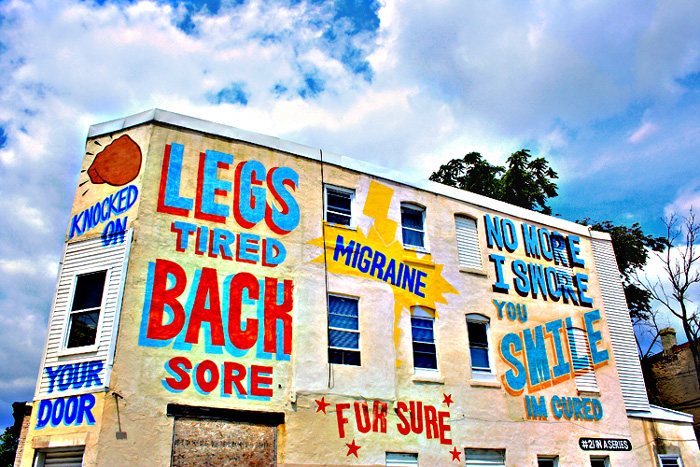 One of the Love Murals on Market Street in West Philly.
One of the Love Murals on Market Street in West Philly.
Sep 10, 2011
 One of the Love Murals on Market Street in West Philly.
One of the Love Murals on Market Street in West Philly.
Feb 29, 2012
 More than fifty walls, rooftops, and billboards high above Market Street, visible mostly from the elevated train line in West Philly, bear pictures and snatches of poetry by former graffiti artist Steve Powers; together they make up his "Love Letter" mural project, one of the city's most popular new tourist attractions.
More than fifty walls, rooftops, and billboards high above Market Street, visible mostly from the elevated train line in West Philly, bear pictures and snatches of poetry by former graffiti artist Steve Powers; together they make up his "Love Letter" mural project, one of the city's most popular new tourist attractions.
"We share sheets," says the writing on the third-floor sidewall of a trackside rowhouse. "We share defeats," says the writing at the end of the block.
The message on the back wall of a warehouse is spelled out in what appear to be refrigerator-magnet letters: "If you were here, I'd be home."
Power says his style grew out of a trip to Northern Ireland, where the political murals on the walls of Belfast struck him as "powerful for all the wrong reasons." In his Love Letter murals, he says he's trying to retain the power but "use it in a really good way."
Apr 20, 2012
 The entire 3800 block of Melon Street, in the Mantua neighborhood of West Philly, got a new coat of paint last summer, thanks to the city's Mural Arts Program and a couple of dozen kids in the neighborhood who apparently are not-so-distant relatives of Tom Sawyer.
The entire 3800 block of Melon Street, in the Mantua neighborhood of West Philly, got a new coat of paint last summer, thanks to the city's Mural Arts Program and a couple of dozen kids in the neighborhood who apparently are not-so-distant relatives of Tom Sawyer.
A new mural isn't going to transform a block, much less a neighborhood. A new coat of paint, even all at once on every house on the block, is unlikely to catalyze dramatic transformation. By all accounts, this was a block and neighborhood that needed a whole lot more than fresh paint. This particular paint job was part of a complex mural-arts project intended to focus attention on the problem of youth homelessness, but that problem, along with Mantua's many other social and economic afflictions, is still very much with us.
Even so, people in fancy neighborhoods aren't the only ones who deserve pleasant surroundings, handsome streetscapes. Melon Street may still be Melon Street, but there's no way this paint job made life there any worse.
Jan 26, 2013
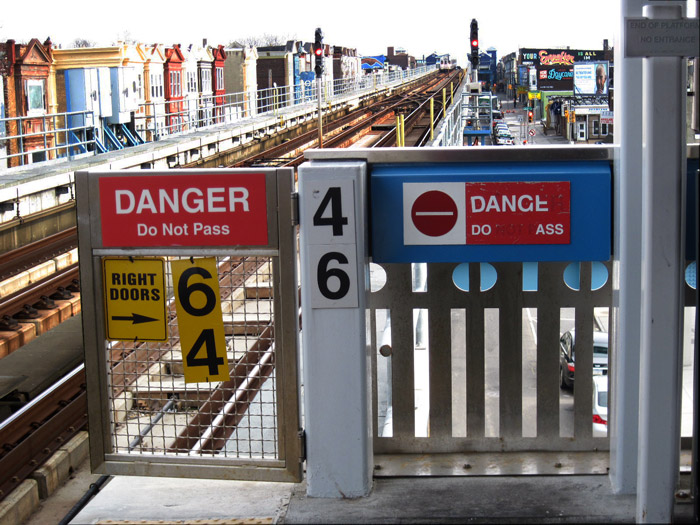 Signs at the end of an el platform in West Philly.
Signs at the end of an el platform in West Philly.
Feb 1, 2013
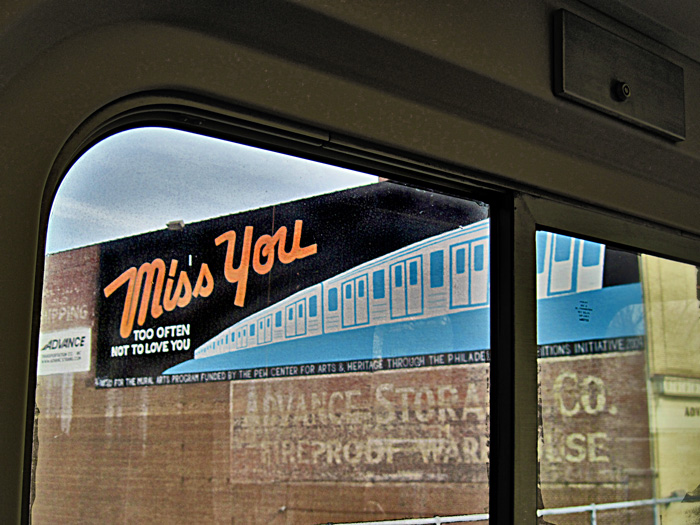 The writing high on the wall of the Advance Storage warehouse, as seen through the window of the elevated train in West Philly.
The writing high on the wall of the Advance Storage warehouse, as seen through the window of the elevated train in West Philly.
Oct 8, 2013
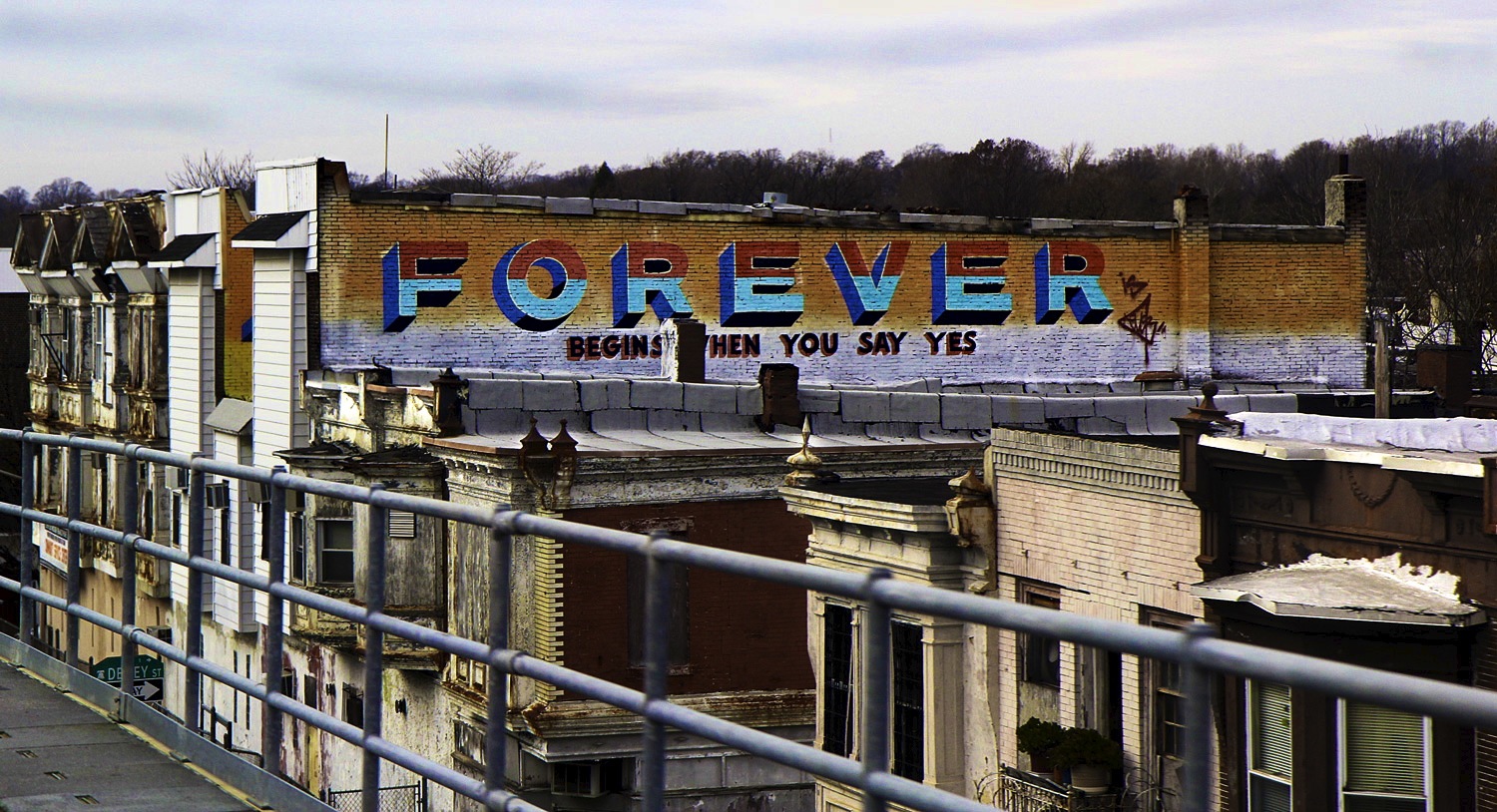 But probably better than a blank wall. See also here and here and here.
But probably better than a blank wall. See also here and here and here.
Jun 2, 2014
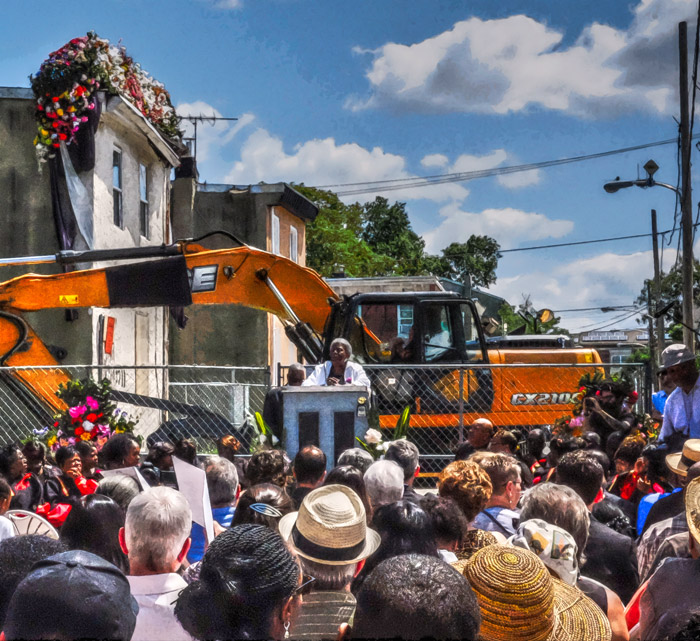 Every day in Philadelphia, houses are declared dead, mostly after long years of painful dilapidation and decay. If they don't collapse or crumble of their own weight, they are demolished, eventually, without ceremony; the machines show up, and the trucks haul away the pieces.
Every day in Philadelphia, houses are declared dead, mostly after long years of painful dilapidation and decay. If they don't collapse or crumble of their own weight, they are demolished, eventually, without ceremony; the machines show up, and the trucks haul away the pieces.
Until Saturday, 3711 Melon Street in West Philly's Mantua neighborhood was no different from all the others. It had sheltered families since 1872. The last owner was Leona Richardson, who bought it in 1946 and brought up her son Roger there. Mantua was a good place to raise a family; the neighbors were poor, but they looked after one another, and they had stores, schools, churches, a post office, a movie theater, a firehouse. The houses were small and already old, rotting, cracking, always needing some kind of repair, but a single mother like Leona Richardson could afford to buy a home of her own in Mantua, and could live there comfortably and see her son grow up and get an education.
Eventually, Miss Leona paid off the house on Melon Street and bought another place a few blocks away, where she lived until her death in 2002. Even before she died, the old house was becoming harder and harder to keep up; after she died, it was basically abandoned. Today, shells of houses like 3711 Melon Street are offered for sale in the neighborhood for $30,000; they languish on the market; nobody thinks they're worth that much. They're 140 years old now, and in recent years they've been better homes for rats than for people.
People have tried to find shelter in them, of course. Drunks and addicts have used them when they could. Drug wars have been fought in and around them. Neighborhood children died in some of these empty houses.
The neighborhood as a whole was grievously wounded, losing families and homes and businesses and city services, and when finally the worst of the houses were sold for scrap, ripped apart and hauled away, the wounds in the fabric of the neighborhood became scars, marks of permanent disfiguring damage. Now only weeds grow tall where once families had flourished. There are more and more gaps in the blocks of rowhouses, ugly gaps, like missing teeth.
But the passing of 3711 Melon Street last Saturday did not go quietly. A proper funeral was observed, complete with flowers, organ, remembrances, eulogy, black armbands, folding fans, food, and "Leaning on the Everlasting Arms." There were printed programs, with color photos of the deceased. And when the machine tore into the house, pallbearers were at the ready, accompanying the dumpster load of what was once a home to its place of final repose.
Needless to say, the funeral for 3711 Melon Street was observed in such a public manner because politicians and community organizers were wanting to draw attention to some of their work. The ground on which the lost house had stood will become part of a parcel slated for development as affordable housing. "Plan, or be planned for," several of the speakers told the gathering.
"I've learned that you can tell a lot about a person," one of the speakers noted, quoting the very recently departed Maya Angelou, "by the way she handles these three things: a rainy day, lost luggage, tangled Christmas tree lights."
The neighbors of Mantua have had to handle a hell of a lot more than those three things. Our thoughts are with them as they deal with this fresh loss.
Feb 26, 2016
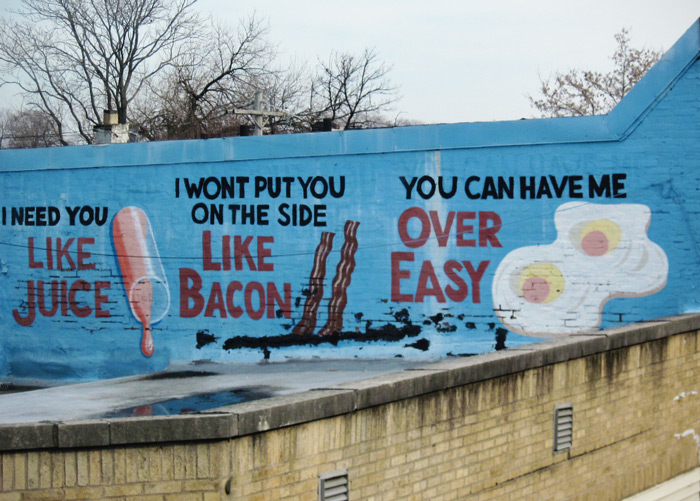 Morning commuters on the el from West Philly to Center City speed past this mural every day; it's part of the rooftop love-letter series by graffiti artist Steve Powers.
Morning commuters on the el from West Philly to Center City speed past this mural every day; it's part of the rooftop love-letter series by graffiti artist Steve Powers.
If it looks a little odd and maybe incomplete–well, yes, it's missing its opening line; the camera lens wasn't wide enough to catch the entire block-long love letter in one snap.
The full verse is: "I want you like coffee, I need you like juice, I won't put you on the side like bacon, You can have me over easy."
Morning poetry. The coffee might help, but then again it might not.